Discover Reason Podcasts
Reason Podcasts
Reason Podcasts
Author: Reason Podcasts
Subscribed: 1,175Played: 147,575Subscribe
Share
© All rights reserved
Description
Founded in 1968, Reason is the planet's leading source of news, politics, and culture from a libertarian perspective. Our podcast offerings include:
The Reason Roundtable
Every Monday, the libertarian editors of the magazine of “Free Minds and Free Markets”—Matt Welch, Nick Gillespie, Katherine Mangu-Ward, and Peter Suderman—discuss and debate the week’s biggest stories and what fresh hell awaits us all.
The Reason Interview with Nick Gillespie
Want to know what comes next in politics, culture, and libertarian ideas? Reason’s Nick Gillespie hosts relentlessly interesting interviews with the activists, artists, authors, entrepreneurs, newsmakers, and politicians who are defining the 21st century.
The Soho Forum Debates
Reason presents a libertarian-themed debate series recorded monthly before a live audience in New York City. Moderated by former Barron's Economics Editor Gene Epstein, the Soho Forum features Nobel prize winners, radical thinkers, and other public intellectuals facing off over the future of bitcoin, veganism, sex work, illegal drugs, electric vehicles, abortion, robotics, government debt, and other controversial topics.
The Reason Roundtable
Every Monday, the libertarian editors of the magazine of “Free Minds and Free Markets”—Matt Welch, Nick Gillespie, Katherine Mangu-Ward, and Peter Suderman—discuss and debate the week’s biggest stories and what fresh hell awaits us all.
The Reason Interview with Nick Gillespie
Want to know what comes next in politics, culture, and libertarian ideas? Reason’s Nick Gillespie hosts relentlessly interesting interviews with the activists, artists, authors, entrepreneurs, newsmakers, and politicians who are defining the 21st century.
The Soho Forum Debates
Reason presents a libertarian-themed debate series recorded monthly before a live audience in New York City. Moderated by former Barron's Economics Editor Gene Epstein, the Soho Forum features Nobel prize winners, radical thinkers, and other public intellectuals facing off over the future of bitcoin, veganism, sex work, illegal drugs, electric vehicles, abortion, robotics, government debt, and other controversial topics.
1391 Episodes
Reverse
This week, editors Peter Suderman, Katherine Mangu-Ward, and Matt Welch are joined by Reason senior editor Robby Soave to dig into the U.S. capture of Venezuela's sitting president, Nicolás Maduro, and what it means for the White House to claim it can "run" another country without congressional authorization. They debate what temporary American control is supposed to mean in practice, whether the capture of Maduro was legal, how war powers and congressional authorization fit into it all, and why White House officials keep framing the moment as a fight to expand U.S. influence in the Western Hemisphere.
The discussion shifts to New York politics after Mayor Zohran Mamdani calls for replacing "the frigidity of rugged individualism with the warmth of collectivism," prompting a debate over his motives to use such rhetoric in his inauguration speech. They also examine Minnesota Gov. Tim Walz's decision not to seek reelection as attention intensifies around a major fraud case that gained national notice following a viral empty-daycare video. A listener question asks whether immigration policy should weigh factors like culture and religion, and what reforms could reduce corruption and conflict without abandoning the case for legal immigration.
0:00—Can the U.S. "run" Venezuela?
12:46—President Donald Trump's foreign policy ambitions
25:52—Mamdani denounces "rugged individualism"
33:46—Listener question on immigrant assimilation
44:30—Walz not seeking reelection
52:22—Weekly cultural recommendations
Subscribe at YouTube: http://youtube.com/reasontv
Like us on Facebook: https://www.facebook.com/Reason.Magazine
Follow us on Twitter: https://twitter.com/reason
Visit the archive: https://reason.com/tags/reason-podcast
This week, guest host Eric Boehm is joined by Lauren Hall, a political science professor at the Rochester Institute of Technology and the author of The Radical Moderate's Guide to Life, a Substack newsletter that encourages readers to reject binary thinking and keep politics from consuming every part of their lives.
Hall's work focuses on the roots of tribalism and political polarization, examining where they come from, why they are so powerful, and how they distort both public debate and personal relationships. She has grown increasingly concerned about the populist impulses shaping American politics on both the right and the left, and about how political elites frame elections as a choice between the lesser of two evils.
In the interview, Boehm and Hall discuss what it means to be a "radical moderate," why she believes that outlook offers a way out of America's broken political compass, and the diverse intellectual influences that have shaped her political philosophy. They also talk about what Hall did not anticipate in the second Donald Trump White House, and how moderates can navigate a political culture that rewards outrage, loyalty tests, and constant engagement.
The Reason Interview With Nick Gillespie goes deep with the artists, entrepreneurs, and scholars who are making the world a more libertarian—or at least a more interesting—place by championing "free minds and free markets."
0:00—Introduction
1:17—What is radical moderation?
6:24—Third parties in America
9:19—Polarization and elitism
15:13—Evolutionary biology and tribalism
27:24—Hall's path to political science
35:06—Culture of Rochester, New York
41:39—Expectations for the second Trump administration
47:19—Radical moderate advice for Democrats
51:03—Lessons from Edmund Burke
Subscribe at YouTube: http://youtube.com/reasontv
Like us on Facebook: https://www.facebook.com/Reason.Magazine
Follow us on Twitter: https://twitter.com/reason
Visit the archive: https://reason.com/tags/reason-podcast
This week, editors Peter Suderman, Katherine Mangu-Ward, and Matt Welch are joined by Reason senior editor Robby Soave to share the stories they believe didn't receive sufficient media attention in 2025. Each panelist selected a story from 2025 in the categories of politics, private industry, global affairs, and culture that deserves a closer look as we head into 2026.
0:00—Political stories that deserved more attention
11:14—The year's underreported economic stories
25:56—Global stories the media overlooked in 2025
37:19—Cultural moments that flew under the radar
Subscribe at YouTube: http://youtube.com/reasontv
Like us on Facebook: https://www.facebook.com/Reason.Magazine
Follow us on Twitter: https://twitter.com/reason
Visit the archive: https://reason.com/tags/reason-podcast
This week, guest host Eric Boehm is joined by Tony Gilroy, the creator, writer, and director of Andor, the critically acclaimed Star Wars series that reimagines the origins of the Rebel Alliance. While Andor is set in a familiar sci-fi universe, it stands apart for its focus on the mechanics of authoritarian rule.
Gilroy discusses how Andor portrays the Galactic Empire not as a cartoonish evil but as a bureaucratic system that centralizes authority, normalizes surveillance, and absorbs previously independent planets, corporations, and cultures. Rather than relying on superweapons or singular villains, authoritarianism in Andor functions through institutions, incentives, and ordinary people just doing their jobs.
Boehm and Gilroy talk about how these themes connect to Gilroy's earlier work, including the Bourne films. They also discuss how Andor approaches moral compromise, resistance, and responsibility, why it matters that fascists still care about mundane details like parking spots, and why the series has resonated with viewers interested in liberty, power, and the quiet ways systems enforce obedience.
The Reason Interview with Nick Gillespie goes deep with the artists, entrepreneurs, and scholars who are making the world a more libertarian—or at least a more interesting—place by championing "free minds and free markets."
0:00–Introduction
1:23–Behemoth
3:21–Andor in the Star Wars timeline
5:04–Cassian Andor's character development
12:04–The moral compass of Andor
18:31–Constructing the authoritarian regime
22:05–The reality of bureaucratic institutions
25:04–Mass media representation in Andor
31:43–Exploiting loneliness and vulnerability
37:40–Would Gilroy return to Star Wars?
39:21–Gilroy's contributions to Rogue One
42:25–The Bourne movies and whistleblowers
46:10–What is the libertarian view of Andor?
53:48–Gilroy's origin story
57:08–Themes in Gilroy's work
Subscribe at YouTube: http://youtube.com/reasontv
Like us on Facebook: https://www.facebook.com/Reason.Magazine
Follow us on Twitter: https://twitter.com/reason
Visit the archive: https://reason.com/tags/reason-podcast
This week, editors Peter Suderman, Katherine Mangu-Ward, and Matt Welch are joined by Reason reporter Eric Boehm to discuss Turning Point USA's AmericaFest and the GOP coalescing around Vice President J.D. Vance as President Donald Trump's successor. They analyze Sen. Rand Paul's (R–Ky.) opposition to endorsing Vance as the party's next standard-bearer, and whether this signals he will challenge Vance for the nomination in 2028. Katherine also shares what it was like attending the conference, plus her debate over marijuana legalization as the Trump administration moves to reclassify marijuana from Schedule I to Schedule III.
The editors then turn to the bipartisan backlash over the latest Jeffrey Epstein file release, in which more than 500 pages were completely redacted, prompting Reps. Thomas Massie (R–Ky.) and Ro Khanna (D–Calif.) to threaten charges of "inherent contempt" against Attorney General Pam Bondi. The panel also discusses the Trump administration's seizure of additional Venezuelan oil tankers, plus the announcement of new military strikes in Syria. They dig into Minnesota's widening welfare fraud scandal, and whether conservative media is using it to scapegoat Somali immigrants. A listener asks whether Christmas expands our "socialist bubble" of family and community and what that says about capitalism, socialism, and human nature.
0:00—Debating marijuana at Turning Point USA
4:10—J.D. Vance is the MAGA heir apparent
14:47—Massie and Khanna react to Epstein file release
25:14—U.S. foreign policy in Venezuela and Syria
38:09—Listener question on socialism and Christmas
47:59—Minnesota welfare fraud scandal
1:01:28—Weekly cultural recommendations
Subscribe at YouTube: http://youtube.com/reasontv
Like us on Facebook: https://www.facebook.com/Reason.Magazine
Follow us on Twitter: https://twitter.com/reason
Visit the archive: https://reason.com/tags/reason-podcast
This week, guest host Zach Weissmueller is joined by Keonne Rodriguez, the founder of Samourai Wallet, a noncustodial bitcoin privacy tool. Rodriguez is currently facing a five-year federal prison sentence for conspiracy to operate an unlicensed money transmitting business, while Samourai's former chief technology officer, William Hill, faces four years. The conversation was recorded just 48 hours before Rodriguez was scheduled to report to prison.
Rodriguez explains why he created Samourai Wallet, tracing its origins to bitcoin's cypherpunk roots and his belief that digital cash should offer the same basic privacy as physical cash. He walks through how Samourai worked, and why it never took custody of user funds.
In the interview, Rodriguez addresses the government's allegations that Samourai facilitated hundreds of millions of dollars in criminal activity, the role of blockchain surveillance firms in shaping those claims, and why he believes prosecutors ignored clear regulatory guidance from the Treasury Department's Financial Crimes Enforcement Network (FinCEN). Rodriguez also explains why he ultimately chose to plead guilty despite believing he broke no law, citing the realities of federal prosecution, judicial reassignment, and what he describes as a stacked legal process.
We examine the broader implications of the case for privacy, free expression, and innovation, including parallels to encrypted messaging, past crackdowns on online marketplaces, and the growing tendency of governments to treat privacy itself as inherently suspicious. Rodriguez also reflects on President Donald Trump's recent comments indicating he would look into the case, the possibility of a pardon, and what it means to face prison time for building a tool intended to protect individual autonomy in an era of expanding surveillance.
The Reason Interview with Nick Gillespie goes deep with the artists, entrepreneurs, and scholars who are making the world a more libertarian—or at least a more interesting—place by championing "free minds and free markets."
0:00—Introduction
0:39—What is Samourai Wallet?
3:31—Bitcoin and financial privacy
9:51—Money transmission and noncustodial wallets
13:15—Justice Department communication with FinCEN
16:27—Responding to the indictment
22:50—Why Rodriguez pled guilty
29:41—Money laundering accusations
34:59—Was Samourai's advertising evidence of guilt?
43:01—Canadian trucker protests and bitcoin
50:37—Trump comments on Rodriguez's case
55:08—Ross Ulbricht's advice to Rodriguez
Subscribe at YouTube: http://youtube.com/reasontv
Like us on Facebook: https://www.facebook.com/Reason.Magazine
Follow us on Twitter: https://twitter.com/reason
Visit the archive: https://reason.com/tags/reason-podcast
This week, guest host Zach Weissmueller is joined by Katherine Dee, a writer chronicling the subcultures of the internet at her Substack default.blog and in columns for The Spectator, Tablet, GQ, UnHerd, and various other publications. Dee also hosts a weekly call-in show that's an homage to the late-night AM radio show Coast to Coast.
Dee talks about the internet as a mystical "other place": fairyland or the astral plane, somewhere you journey and play by different rules, interact with unusual entities, and hope you emerge with your sanity intact.
In this interview, they discuss the shift from the "internet utopianism" of the '90s and early 2000s, where cyber philosophers mused about netizens "forming our own social contract" in a borderless digital space where "governments have no sovereignty," to internet pessimism, where politicians fret about online misinformation and extremism, parents worry their kids are "cooked" by short-form brain rot, and the media tell us AI will replace our jobs, our friends, and our romantic partners.
Dee has a remedy, and she calls it "internet realism." It's time to step out of fairyland and remember what the internet is: a tool. We humans use tools to reshape the world, but so, too, do tools reshape humans. Wield them wisely.
The Reason Interview With Nick Gillespie goes deep with the artists, entrepreneurs, and visionaries who are making the world a more libertarian—or at least a more interesting—place by championing "free minds and free markets."
0:00—Introduction
1:42—Dee's relationship with the internet
7:16—The early days of the internet
13:48—Has the internet changed us?
18:21—Mythological analogies
23:00—Benefits of logging off
27:15—Falling in love with AI chatbots
33:39—Smartphones and anxiety
42:11—Defending pseudonymity
50:46—The death of reading
55:52—Internet nihilism and violence
1:01:20—Embracing internet realism
Subscribe at YouTube: http://youtube.com/reasontv
Like us on Facebook: https://www.facebook.com/Reason.Magazine
Follow us on Twitter: https://twitter.com/reason
Visit the archive: https://reason.com/tags/reason-podcast
This week, editors Peter Suderman, Katherine Mangu-Ward, and Matt Welch are joined by associate editor Liz Wolfe to discuss President Donald Trump's executive order blocking states from enforcing their own artificial intelligence regulations. The panel debates whether a single national framework for AI is necessary to keep American tech companies competitive or whether it represents a serious blow to federalism. They also examine the White House potentially reclassifying marijuana as a Schedule III drug and what that change could mean for the cannabis industry, tax policy, and federal drug enforcement.
The editors then turn to mass shootings in Australia and at Brown University, including the actions of a bystander credited with saving lives at Bondi Beach, and what these incidents suggest about gun control debates. They discuss the U.S. seizure of a Venezuelan oil tanker and threats of land strikes against the Nicolás Maduro regime, and cover the conviction of Hong Kong media tycoon Jimmy Lai under China's national security law and what it signals for press freedom and U.S.-China relations. A listener asks whether modern socialism reflects moral aspirations that could be redirected toward liberty rather than centralized power.
0:00—Trump blocks states from regulating AI
10:31—Reclassifying marijuana as a Schedule III drug
18:39—Mass shootings in the U.S. and Australia
26:59—U.S. seizes Venezuelan oil tanker
36:48—Listener question on optimism for socialism
46:08—Jimmy Lai found guilty by Hong Kong court
57:12—Weekly cultural recommendations
Subscribe at YouTube: http://youtube.com/reasontv
Like us on Facebook: https://www.facebook.com/Reason.Magazine
Follow us on Twitter: https://twitter.com/reason
Visit the archive: https://reason.com/tags/reason-podcast
The Reason Interview with Nick Gillespie, goes deep with the artists, entrepreneurs, and scholars who are making the world a more libertarian—or at least a more interesting—place by championing free minds and free markets.
Today's guest is Sarah McLaughlin, a senior scholar at the Foundation for Individual Rights and Expression (FIRE) and author of Authoritarians in the Academy: How the Internationalization of Higher Education and Borderless Censorship Threaten Free Speech.
She explains how governments in places like China and the United Arab Emirates restrict academic freedom and expression not just in their own countries but also at colleges and universities in America by exploiting speech codes and threatening to end lucrative satellite campus arrangements.
McLaughlin and Gillespie also talk about whether it was a good idea for American comedians to censor their material at Saudi Arabia's Riyadh Comedy Festival and what to make of President Donald Trump's repeated minimization of the murder of Washington Post contributor Jamal Khashoggi by Saudi operatives.
0:00—Introduction
1:14—Trump's response to Khashoggi's murder
7:26—The Riyadh Comedy Festival
11:29—Foreign influence on U.S. college campuses
23:55—The NBA and the Chinese government
28:39—Sensitivity exploitation
34:36—Changes to campus culture
39:46—Satellite campuses
43:50—Matthew Hedges and the UAE
50:03—McLaughlin's path to FIRE
51:55—Solutions to campus censorship
58:12—Climate of free speech under Trump
Subscribe at YouTube: http://youtube.com/reasontv
Like us on Facebook: https://www.facebook.com/Reason.Magazine
Follow us on Twitter: https://twitter.com/reason
Visit the archive: https://reason.com/tags/reason-podcast
This week, editors Peter Suderman, Katherine Mangu-Ward, and Matt Welch are joined by associate editor Liz Wolfe to sort through the political free-for-all surrounding the Warner Bros. and Netflix merger. They look at why Sen. Elizabeth Warren (D–Mass.) is urging regulators to block the deal, why President Donald Trump says he plans to get personally involved, and how Jared Kushner's role in a rival Paramount bid is reshaping the fight. The panel digs into whether this moment signals a real return to trustbusting or another round of theatrics from both sides.
The editors then turn to the economy, where Trump's tariff strategy is colliding with rising layoffs and growing unease within his own party. They assess the administration's new national security posture as Congress advances a defense bill that exceeds White House requests, and discuss the uproar over Kalshi's push to turn opinion into a tradable market. Also, a listener asks whether a renewed turn toward religious faith could help the country lower its political temperature.
It's that time of year when we ask you to open your wallets, dear listener, and make a tax-deductible donation to Reason's annual webathon: https://reason.pub/4pzsSOE.
0:00—Antitrust and the Netflix-Warner Bros. acquisition
19:17—Tariff failures and rising unemployment
27:43—National security strategy memo
36:50—Listener question on polarization and faith
48:13—Kalshi's controversial online gambling vision
58:33—Weekly cultural recommendations
Subscribe at YouTube: http://youtube.com/reasontv
Like us on Facebook: https://www.facebook.com/Reason.Magazine
Follow us on Twitter: https://twitter.com/reason
Visit the archive: https://reason.com/tags/reason-podcast
It's that time of year when we ask you to open your wallets, dear listener, and make a tax-deductible donation to Reason's annual webathon: https://reason.pub/4pzsSOE.
In this special episode of The Reason Roundtable, editors Matt Welch, Katherine Mangu-Ward, Robby Soave, and Peter Suderman respond to all of your burning questions. Nothing is off limits!
Subscribe at YouTube: http://youtube.com/reasontv
Like us on Facebook: https://www.facebook.com/Reason.Magazine
Follow us on Twitter: https://twitter.com/reason
Visit the archive: https://reason.com/tags/reason-podcast
The Reason Interview With Nick Gillespie goes deep with the artists, entrepreneurs, and visionaries who are making the world a more libertarian—or at least a more interesting—place.
Please donate to Reason's annual webathon, the one time a year when we ask our online audience to support our principled libertarian journalism with tax-deductible donations. Click here for details, swag, and more information.
Today's guest is the science writer Matt Ridley, author of best-selling books such as The Red Queen, The Rational Optimist, and, with Alina Chan, Viral: The Search for the Origin of COVID-19. At a live event filmed in New York City, Ridley tells Nick Gillespie that political and cultural elites had already turned science, our best tool for understanding and improving the world, into a centralized, hyperpoliticized priesthood even before COVID.
He walks through the collapse of public trust in 2020 as experts flipped on masks and transmission, declared Black Lives Matter protests safe but religious services dangerous, and insisted on certainty where none existed. Ridley also explains how the lab leak hypothesis went from being a forbidden conspiracy theory to the most plausible explanation for the pandemic.
He shares his thoughts on why climate alarmism is finally waning, the future of innovation in an age of overregulation, why he's bullish on the future of nuclear power and AI, and how America can spark a new technological renaissance—even when leaders seem determined to smother dissent.
0:00—Introduction
1:59—Bill Gates' climate change reversal
6:15—How COVID diminished public trust
14:27—Centralization and confirmation bias
17:53—Vaccine skepticism
21:29—Sex and evolutionary theory
29:47—Politicization of science
31:34—COVID lab leak theory
37:50—Human progress
46:10—The role of storytelling
Subscribe at YouTube: http://youtube.com/reasontv
Like us on Facebook: https://www.facebook.com/Reason.Magazine
Follow us on Twitter: https://twitter.com/reason
Visit the archive: https://reason.com/tags/reason-podcast
This week, editors Peter Suderman, Katherine Mangu-Ward, Nick Gillespie, and Matt Welch dig into the disconnect between strong Black Friday spending and a public mood shaped by rising costs, economic anxiety, and slipping approval numbers for President Donald Trump. They explore why so many Americans feel poorer despite higher overall wealth, how regulation and subsidies have distorted key markets like housing and health care, and what to make of polling that shows young voters warming to democratic socialism.
The conversation then turns to the war crime allegations against Defense Secretary Pete Hegseth, who allegedly gave the orders to "kill everybody" on Venezuelan boat strikes that resulted in the killing of survivors, and what limits actually exist on the use of military force. The editors also examine a new federal ban on hemp products and the damage it could inflict on a growing legal industry. A listener asks whether recent Immigration and Customs Enforcement (ICE) actions signal a troubling erosion of constitutional protections, and the group takes time to reflect on the legacy of playwright Tom Stoppard and his long association with free speech and small government ideals.
Join us this Thursday, December 4, at 2:30 p.m. ET for a special live edition of The Reason Roundtable as part of our annual webathon. Send your questions for the Reason editors to podcasts@reason.com with "Webathon" in the subject line.
Watch at: https://www.youtube.com/watch?v=yaOOdtJqzmY
0:00—Economic anxiety and standards of living
18:45—War crime allegations against Hegseth
32:09—Federal hemp ban threatens industry
37:35—Listener question on ICE constitutionality
46:45—The legacy of Tom Stoppard
56:31—Weekly cultural recommendations
Subscribe at YouTube: http://youtube.com/reasontv
Like us on Facebook: https://www.facebook.com/Reason.Magazine
Follow us on Twitter: https://twitter.com/reason
Visit the archive: https://reason.com/tags/reason-podcast
The Reason Interview With Nick Gillespie goes deep on the thinkers, doers, and artists who are making the 21st century a more libertarian—or at least more interesting place—by challenging outmoded ideas and orthodoxies.
Today's guest is Ken Burns, the filmmaker who has massively reshaped national conversations about everything from the Civil War to baseball to jazz to immigration to national parks with epic documentary series that have aired on public television.
His latest work is The American Revolution, a 12-hour series about the nation's founding that he codirected with Sarah Botstein and David P. Schmidt. As the nation prepares to celebrate its 250th anniversary next year, the American Revolution foregrounds the bloodiness of the war for independence from the British and the high levels of disunity among the colonists before and after the conflict, themes especially noteworthy in a society that is increasingly concerned about political violence and polarization. The series can also be seen as a rebuke to recent, overtly ideological attempts to recast the American experiment as morally irredeemable from its origins (The 1619 Project) or as a Disneyfied morality tale (The 1776 Project).
Burns talks with Gillespie about the role of truth in documentaries and why we should embrace contradictions in historical storytelling. They also debate whether PBS, defunded earlier this year by the Trump administration, should continue to receive tax dollars.
0:00—The American Revolution was a global war
7:52—Slavery in the Revolution and competing narratives
21:48—The logic of the Declaration of Independence
29:14—The impact of Native Americans
32:41—Why the Revolution leaves Burns feeling optimistic
39:09—The importance of New York in the Revolution
46:15—Funding for public broadcasting
53:16—What's next for Ken Burns?
56:26—Why understanding history is important for unity
Subscribe at YouTube: http://youtube.com/reasontv
Like us on Facebook: https://www.facebook.com/Reason.Magazine
Follow us on Twitter: https://twitter.com/reason
Visit the archive: https://reason.com/tags/reason-podcast
This week, editors Peter Suderman, Katherine Mangu-Ward, and Nick Gillespie are joined by Reason senior editor Robby Soave to discuss President Donald Trump's unexpectedly warm White House meeting with New York mayor-elect Zohran Mamdani and why he now describes the socialist's agenda as "practical." They examine what this moment suggests about Trump's shifting political instincts, how it fits with his recent comments on tariffs and the state of the economy, and what the disbanding of the Department of Government Efficiency (DOGE) signals about his governing approach.
The group then looks at Trump's attempt to influence the pending Warner Bros. merger and the broader media landscape, including worries about misinformation and new reporting that major MAGA influencer accounts on X are operating from overseas. The panel also considers the implications of six Democrats telling service members they do not have to obey illegal orders and the ensuing backlash. A listener asks how to reconcile consumer benefits from intense market competition with the need to preserve incentives for long-term innovation and investment.
0:00—DOGE disbands
4:02—Trump meets Mamdani in the oval office
14:50—White House seeks influence over Warner Bros. merger
27:58—Red Scare, Oliva Nuzzi, and cancel culture
38:46—Listener question on preserving incentives in a market economy
51:29—Democrats encourage military not to follow illegal orders
57:49—Weekly cultural recommendations
Subscribe at YouTube: http://youtube.com/reasontv
Like us on Facebook: https://www.facebook.com/Reason.Magazine
Follow us on Twitter: https://twitter.com/reason
Visit the archive: https://reason.com/tags/reason-podcast
Princeton University professor Paul Frymer and Wall Street Journal columnist Jason Riley debate the resolution, "The U.S. Supreme Court's 2023 decision to dismantle affirmative action in American higher education marked a significant regression in the pursuit of racial equality."
Arguing for the affirmative is Frymer, a professor of politics at Princeton. He's the author of Uneasy Alliances: Race and Party Competition in America and Black and Blue: African Americans, the Labor Movement, and the Decline of the Democratic Party.
Arguing against the resolution is Riley, a senior fellow at the Manhattan Institute. He's also the author of several relevant titles, including The Affirmative Action Myth: Why Blacks Don't Need Racial Preferences To Succeed and Please Stop Helping Us: How Liberals Make It Harder for Blacks to Succeed, False Black Power.
The debate is moderated by Soho Forum director Gene Epstein.
Sen. Rand Paul explains why he wants the Epstein files released, lays out his case against Trump’s tariffs and military strikes in Venezuela, and argues that he and Rep. Thomas Massie are the last voices in Congress still committed to libertarian ideals.
https://reason.com/podcast/2025/11/20/rand-paul-congress-is-afraid-of-the-president/
The Reason Interview with Nick Gillespie goes deep with the artists, entrepreneurs, and politicians who are defining the 21st century in terms of individual freedom and autonomy.
Today's guest is Sen. Rand Paul, the libertarian-leaning Republican from Kentucky. He talks about why he cosponsored legislation to release all of the Jeffrey Epstein files, how President Donald Trump's tariffs and bombing of Venezuelan boats are bad policy and unconstitutional, and why fellow Republicans like Vice President J.D. Vance are Luddites and nostalgia merchants who want to regulate free markets to death.
Paul, the subject of a 2014 New York Times Magazine article titled "Has the 'Libertarian Moment' Finally Arrived?", also talks with Gillespie about his plans for a 2028 presidential run, the enduring anti-war legacy of his father Ron Paul, and why he believes that he and Rep. Thomas Massie (R–Ky.) are the only members of Congress who have stayed true to the Tea Party's commitment to lower spending and smaller government.
0:00—Releasing the Epstein files
2:32—Tariffs and protectionist propaganda
6:29—The economic policies of the GOP
11:32—Military strikes on Venezuela
13:27—Foreign intervention
15:16—Military aid and arms deals
19:38—Congressional spending and the debt
22:04—Federal hemp ban
23:30—What's happened to the Tea Party?
26:00—Will Paul run for president again?
The Reason Interview With Nick Gillespie goes deep with the artists, entrepreneurs, policymakers, and journalists who are making the world a more libertarian—or at least a more interesting—place by challenging worn-out ideas and orthodoxies.
Earlier this year, The Washington Post's owner, Jeff Bezos, announced that the opinions section of his paper would be "writing every day in support and defense of…personal liberties and free markets." Today's guest is the person Bezos hired to execute that mission.
He's Adam O'Neal, a 33-year-old Southern California native whose resume includes stints at The Economist, The Dispatch, The Wall Street Journal, Real Clear Politics, and covering the Vatican for Rome Reports. O'Neal tells Gillespie his goal is to build a nonpartisan editorial section rooted in core American values of free expression, free enterprise, and limited government. That means taking on MAGA and the Trump administration, insurgent Democratic Socialists, and censors and statists in both parties. "It's small L libertarian…classical liberal," says O'Neal of the section he's building. "It's non-partisan and free markets and personal liberties are the North Star."
O'Neal talks about the challenges in bringing a classical liberal sensibility to mostly left-of-center readers, how growing up in California informs his thinking, what he thinks of Pope Francis' and his American successor Pope Leo's attitudes toward capitalism, and why newspapers shouldn't endorse candidates.
0:00—Introduction
1:39—Writing in defense of free markets and personal liberties
7:40—Government threats to free speech
14:01—The Washington Post's editorial decisions
18:59—The state of free markets in America
21:52—Is the opinion section becoming libertarian?
34:09—O'Neal's origin story
40:46—Pope Francis and capitalism
45:17—Experiences at The Dispatch and The Economist
52:59—The culture of The Washington Post's opinions team
55:38—Generational change in politics and culture
59:04—The Washington Post ends candidate endorsements
Subscribe at YouTube: http://youtube.com/reasontv
Like us on Facebook: https://www.facebook.com/Reason.Magazine
Follow us on Twitter: https://twitter.com/reason
Visit the archive: https://reason.com/tags/reason-podcast
This week, editors Peter Suderman, Katherine Mangu-Ward, and Nick Gillespie are joined by Reason reporter Eric Boehm to unpack President Donald Trump's sudden shift on the Jeffrey Epstein files after trying to block the vote, the GOP pressure campaign behind it, and what the episode suggests about his grip on the party. They also examine Trump's mixed signals on tariffs, including his move to roll back duties he imposed in the first place, and whether this moment reinforces the basic economic arguments critics have made for years. The group also digs into whether Trump's proposed tariff dividend makes any economic sense.
The conversation then turns to rising tensions with Venezuela as unauthorized strikes continue and Trump signals interest in direct talks with Nicolás Maduro. A listener then asks what would need to change in order to push American health care away from government-run insurance and toward a system shaped by private plans.
https://reason.com/podcast/2025/11/17/how-the-epstein-files-turned-maga-against-trump/
The Reason Interview with Nick Gillespie goes deep with the artists, activists, entrepreneurs, policymakers, and visionaries who are making the world a more libertarian—or at least more interesting—place by championing free minds and free markets.
Today's guest is Katie Herzog, co-host of the popular Blocked & Reported podcast and author of the paradigm-shattering new book Drink Your Way Sober. Katie writes about her and other people's experiences with The Sinclair Method—a medication-assisted approach to alcoholism where you use one drug to counter problematic use of another. Her story—and the cutting-edge research and treatment she reports on—upends just about everything we think we know about drug use, recovery, and autonomy.
She talks with Nick Gillespie about naltrexone, the drug that helped her retrain her brain, why Alcoholics Anonymous works for some people but not for others, and how modern medicine is finally catching up to the idea that we should treat adults like adults when it comes to what we put in our bodies.
They also get into the insane cancel culture politics that gave rise to her and Jesse Singal launching the Blocked & Reported podcast in 2020, whether we've passed peak woke, and if conservatives are now simply presiding over their own version of cancel culture.
Previous appearance: Katie Herzog and Jesse Singal on Left-Wing Cancel Culture, June 17, 2020.
0:00—Introduction
1:34—What is the Sinclair Method?
6:59—Herzog's experience with alcoholism
15:50—Sexuality, self-identity, and self-loathing
22:22—Recognizing addiction and the myths of willpower
27:43—Alternatives to Alcoholics Anonymous
35:03—Herzog on differences in weed and alcohol use
38:44—Beta-blockers for overcoming anxiety
43:51—Transgenderism in media and cancel culture
58:29—Tolerance vs. agreement
Subscribe at YouTube: http://youtube.com/reasontv
Like us on Facebook: https://www.facebook.com/Reason.Magazine
Follow us on Twitter: https://twitter.com/reason
Visit the archive: https://reason.com/tags/reason-podcast




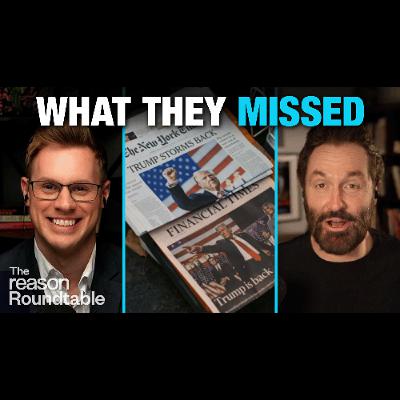
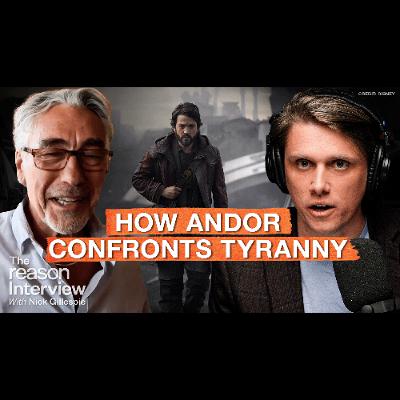






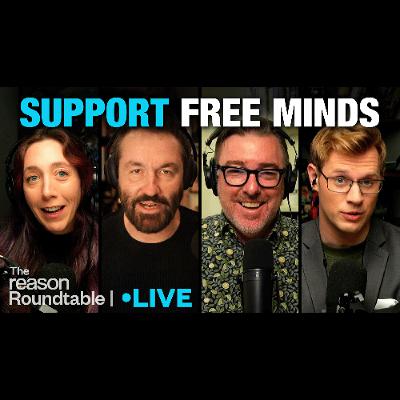

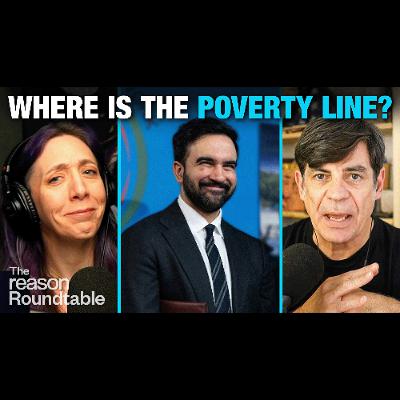


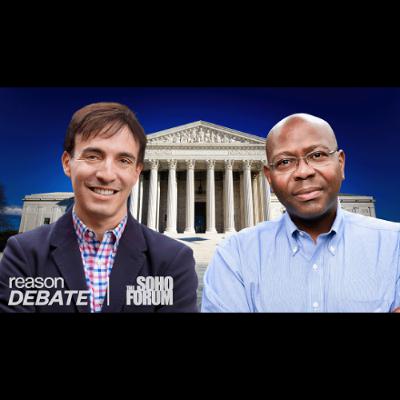







I had never heard of Bulwark but I will not be listening to Bulwark.
Very enlightening.
very impressed by both of these fine gentlemen willing to sit down and work through this
Your podcast is becoming unlistenable
John Wick 4 was a terrible movie
Katherine going "Neeerds!!" never fails to crack me up 😂
brilliant!!
this guy is full of shit. our crime rate has been decreasing since the 1990s, while the incarceration rate just started declining around 2013.
how libertarians should think?
That's funny, I feel like this is only the beginning of a permanent state. What makes you so optimistic and trusting in a system that is lying to you so much and so transparently?
I think we need a new debate with the current state of affairs.
pro Biden guy is full of crap... anyone who uses the trump doesnt denounce violence line can go kick rocks
It's interesting hearing Ira lay out how the printing press and other forms of expression were controlled by government entities to limit the freedom of people, then in the next breath implies those methods would be a good thing to do regarding guns. He's a fantastic champion of the 1st amendment but fails to see a connection with the 2nd amendment. Those who we can't be trusted with our first shouldn't be trusted with our second.
Are racist racists racist for being racist? A Washington Post article says yes. This was the most ideologically charged and frail defense of the proposition thus produced in the Soho Forum Debates. He never actually articulates how "white parents" self-organizing is debilitating to "black parents" in any way. It's an assumed racial link as is the trend. Blacks are 13% of the population, if a mostly white community doesn't have black students in the pods is that racist or just a fact of population spread? What about the unfortunate fact wealthy white and black, immigrant (including blacks), Asian, and Jewish families highly prioritize education to a statistically notable degree over low income African American and white families. The issue is only racism if you want it to be as to justify your patronizing savior complex. Read technical literature, look at polls, read studies, communicate with the people in need of better education and you find no racist bogeyman. You find a culture of i
So I'm confused.... it would be good to jump into conflict to stop the assault, rather then marking ppl then collecting them afterwards?